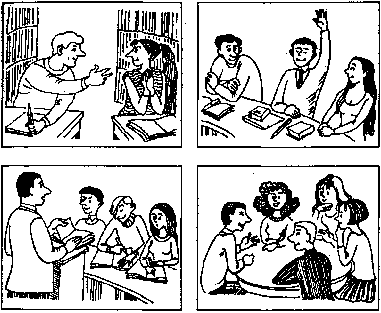
108
1.
What has happened? Why do you think so?
2.
What is happening now? Why do you think so?
3.
What is going to happen? Why do you think so?
Exercise 27
I. Read and translate the story.
Distractions are a problem Barbara has to deal with when she is supposed to be studying. She spends too
much time on the phone. She intends to concentrate on her homework, but finds herself talking to friends or
writing lettere instead of reading up for seminars, taking notes or writing essays. It is hard for her to say, 'No,
I can't do this or go there. I have to study.' Her homework often suffers because she procrastinates. When she
studies in her room, it is full of distractions. Her phone, radio, tape player and her cat are there. She finds
herself daydreaming, answering the phone, listening to tapes or petting the
cat. She is often disturbed by
family members. It is easy to see where all her time goes — not to studying. Now she is letting the
answering machine do its job. She puts the cat out before she starts to study. Her homework is now done
before everyone gets home from work.
II. Find the English equivalents for the following.
Решать проблему; тратить время на что-либо; сконцентрироваться на ч¸м-либо; готовиться к
семинару; делать пометки; писать эссе; откладывать со дня на день; мечтать; е¸ часто отвлекают;
время уходит; приходить домой с работы.
III. Speak about your distractions. Use the patterns from the text:
1) Barbara is supposed to be studying.
2) Barbara has to deal with a problem.
3) Barbara finds herself talking to friends instead of reading up for seminars.
4) Barbara is often disturbed by family members.
Exercise 28
1. Read and translate the story. Answer and discuss in class the questions below. Continue the story.
It took a couple of weeks for classes to get settled, and then we got down to the nitty-gritty. As homework
began pouring in, and tests loomed on the horizon, I realised that my study skills were very poor and that it
was going to be a challenge in itself to teach myself to study. I experimented with several tactics, trying to
find out what would work for me. I started out in the bedroom with the door closed, but it seemed the phone
was always ringing. I managed to get my work done, but I was not pleased with this frustrating situation.
Later I tried going outside and preparing somewhere in the yard. I ended up chatting with a neighbour,
petting her dog. Cleariy, something had to be changed. As my workload increased, so did my frustration.
Quite by accident, however, I found the solution to my problem ...
II. Find the English equivalents to the Russian words and phases.
На это ушла пара недель, прийти в норму, засесть за что-либо, повседневная работа, наваливаться,
маячить, слабые навыки, вызов, экспериментировать с чем-либо, обнаружить, начинать (разг.),
удаваться, оканчиваться, удручающая ситуация, выходить из дома, болтать, работа накапливалась,
разочарование, совершенно случайно, решение проблемы.

